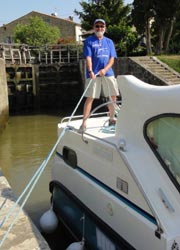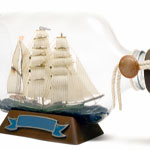Buying a Boat
Buying a boat is an exciting purchase with visions of fun-filled hours on the water.
You've made your decision on the type of boat that you wish to buy and the advertisement sounds like it could be exactly what you are looking for.
Further down on this page we provide a checklist to help you evaluate the boat on offer and to help you formalize your transaction.

We also offer the following free legal forms and more guidelines:
- Tips for selling a boat
- Bill of sale where a single payment is made
- Installment sale agreement or hire purchase agreement for a boat
- Limited Power of Attorney for boat transactions
- Boat rental agreement
For more information and legal forms and please visit our Main Boating Page.
When responding to an advertisement, get the following information from the seller to help you decide whether it will be worth your time viewing the boat.
- How many hours does the motor have - excessive hours may mean extra money to be spent on maintenance.
- ASK: "Has it ever been in an accident".
- Does it have a maintenance history and proof of this.
- Has it been used in salt water (reduces the value because of higher corrosion).
- Have there been any manufacturers recalls on that specific model and if yes, have the repairs been done. You can do your own check on models before buying a specific boat.
- Has the boat ever been fined or are there any fines outstanding against the boat.
- How was it stored during the off-season and were proper winterization procedures followed.
- Does it come with the owner's manual, service manual and any spare parts or accessories.
- Is it Coast Guard Approved.
- Are there any monies outstanding with a finance institution.
- Is the registration current.
- NOTE that certain HOUSEBOAT Models or Types have specific requirements.
The Actual Boat Inspection
Ask for proof of ownership and compare all the numbers such as the HIN (Hull Identification Number) with the actual numbers on the boat. The HIN can be found at the stern at the top right hand corner.
Unless you are a boat and engine expert, take a mechanic along to help with the engine inspection before buying a boat.
On larger and more expensive boats this boat inspection should rather be done by an independent marine surveyor (the prospective buyer normally pays the cost thereof).
Do a thorough out of water inspection first before you launch and start the boat. This allows the engine to cool (if necessary) and you can better judge if it will start from cold.

Checking the Boat's Engine
- Do a compression check on the engine:
Remove the spark plugs and disable the engine with the kill switch.
Hook the compression tester to the cylinders one by one.
Turn the ignition key and read the gauge: 105 - 100 pounds per cylinder is acceptable or check if the pressure is within the manufacturer's tolerance.
However, if there is a difference of more than 15 lbs on any given cylinder there may be serious problems. - Check the oil color and level - a milky color signals the presence of water which may indicate a cracked cylinder head. Similarly any oil in the bilge signals an oil leak!
- Check the general condition of the engine such as brittle hoses and broken engine mounts.
- Are the batteries in good condition, in acid-proof containers.
- Does the motor tilt easily from the down to the angled position.
- Check the condition of the spark plugs.
The Test Drive
- Does the engine start easily from cold and does it run smoothly.
- Check if all the systems are working (lights, blower, winch, fresh-water supply, air conditioner etc). If the bilge pump does not have time to kick in during the test drive you can hose some water into the engine hole to test it later.
- Does the boat respond easily and quickly to the steering at varying speeds.
- Are the gear changes smooth and does the reverse gear work properly.
- Check the gauges and instruments - monitor the temperature and check for overheating and check the RPM and odometer.
- Does the boat come on plane within 5 seconds.
- Does it emit blue smoke (beware).
Finally...

- When in doubt ... throw it out! There are plenty more to choose from.
- Negotiate - the seller probably listed it a bit higher, expecting some bargaining.
- Find out from your local authorities what they require to transfer ownership when you are buying a boat.
- Get the title signed over to you by the OWNER.
- Clarify with the seller who is responsible for any repairs to be done and stipulate that in your free boat bill of sale as well as a time limit.
- Get your boat insurance in place before sailing off into the sunset.
You are here:




